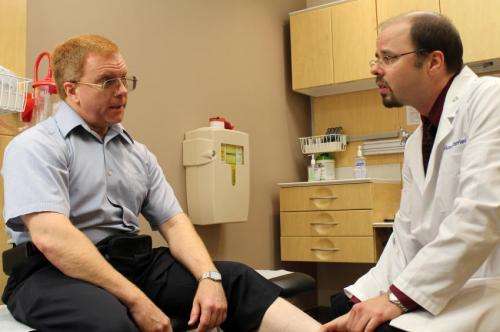Patient's question triggers important study about blood thinners

Physicians around the world now have guidance that can help them determine the best oral blood thinners to use for their patients suffering from blood clots in their veins, thanks to a patient of The Ottawa Hospital who asked his physician a question he couldn't answer. This new guidance is found in a study published today by JAMA, the Journal of the American Medical Association.
"Right there in the clinic, he identified an important knowledge gap for clinicians. We decided to act on it and find the answer," says hematologist Dr. Marc Carrier, who also a scientist at The Ottawa Hospital and associate professor at the University of Ottawa.
Dr. Carrier was treating Jamie Dossett-Mercer for major blood clotting in his leg veins, called deep vein thrombosis, that reached from his ankle to his groin. If one of these clots were to break off, it could travel to the lung and cause a pulmonary embolism, which is often fatal. These two common medical conditions are known together as venous thromboembolism and form the third leading cause of cardiovascular death.
In recent years, a number of new oral anticoagulants have been approved for use. Faced with eight possible therapies, Dossett-Mercer asked, "How do all these different blood thinners compare head to head?"
Dr. Carrier went looking for the answer. Although he found dozens of trials that studied the effect of different agents separately, none had analyzed all the results together.
His team reviewed 45 randomized trials (involving nearly 45,000 patients) using a process called network meta-analysis, which allows them to set a baseline treatment and compare all the other treatments to that. All the clinical trials they found compared the newer treatments to the standard of care, which is low-molecular-weight heparin (LMWH) with vitamin K antagonists.
Using the LMWH-vitamin K antagonist combination as the central node of the network, they compared safety and effectiveness with seven other anticoagulant therapies for venous thromboembolism: unfractionated heparin (UFH) with vitamin K antagonists; fondaparinux with vitamin K antagonists; LMWH with dabigatran; LMWH with edoxaban; rivaroxaban; apixaban; and LMWH alone.
While they found no major differences in effectiveness and safety, there were some notable variations.
- Patients taking the UFH-vitamin K antagonist combination had a higher percentage who experienced a recurrent blood clot within three months.
- Patients taking rivaroxaban and apixaban had a lower percentage who experienced a major bleeding event within three month.
"This will help physicians tailor their care according to patient characteristics," says Dr. Carrier. "For example, if I am worried about recurrent clotting, but I'm not too worried about the risk of bleeding, then I can select the drug with the best safety profile."
"I was already impressed with Dr. Carrier's exceptional care," says Dossett-Mercer. "But that he would do this research based on a patient question is just astounding."
More information: The full article "Clinical outcomes associated with treatment of acute venous thromboembolism: A systematic review and meta-analysis" was published September 16, 2014, by JAMA. jama.jamanetwork.com/article.a … 1001/jama.2014.10538


















